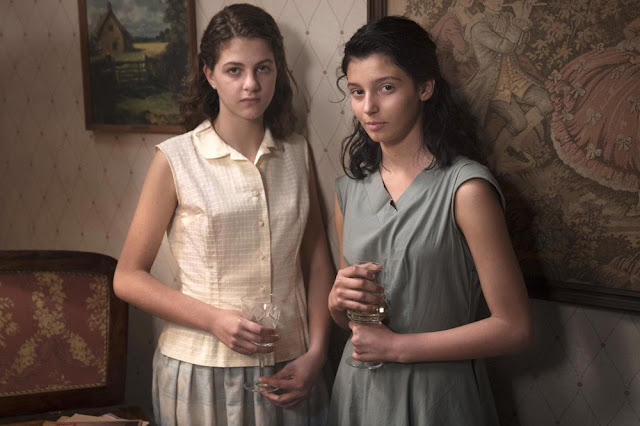Las mil y una
(Español/English)
Por un lado, Las mil y una acompaña el coming age de Iris, fascinada con Renata, una suerte de desenvuelta femme fatal mayor que ella que está de vuelta en las Mil; ambas se irán acercando con el telón de fondo de ciertas habladurías. Pero también es sobre la estrecha amistad de Iris con sus primos y sobre cómo ambos hermanos viven su sexualidad gay de maneras muy diferentes, en un entorno donde las elecciones sexuales y sus campos de acción distan de estar tabicados y el celular es un medio para un intercambio transgresor.
Los y las jóvenes de Las mil y una constituyen un mundo con adultos casi siempre fuera de campo. La cámara de Navas los acompaña con larguísimos planos secuencia muchas veces en movimiento, y también prolongados planos fijos, otorgándoles a las escenas y los diálogos una enorme naturalidad (es de hacer notar también que a veces cuesta entender lo que dicen). En el plano sexual, prima una total franqueza, donde el recato o lo explícito son absolutamente coherentes con la psicología de los personajes y las situaciones. Ciertas escenas me remitían a La ciénaga, de Lucrecia Martel y no pude evitar relacionar el film en general (su melancolía, su relajación, su conexión con los personajes) con Who Are Who We Are, la serie de Luca Guadagnino (que se estrenó después) sobre otro grupo de jóvenes (mucho más acomodado, por cierto) en el mundo cerrado de una base militar.
En suma, la segunda película de la joven directora correntina Clarisa Navas es un potente retrato de la circulación del afecto, el deseo y la sexualidad en un grupo de jóvenes en ese barrio marginal y una historia de amor y de amores, lejos del costumbrismo y de cualquier miserabilismo.
Agrego un interesante reportaje a la directora y parte del elenco.
................................................................................................................................................................
Las mil y una
Iris (Sofía Cabrera)) lives in the poor neighborhood of Las
Mil Casas, in Corrientes (Argentina). She dropped out of school and shared her
free time with her gay cousins Darío (Mauricio Vila) and Ale (Luis Molina) or
wandered around the labyrinthine neighborhood chipping her basketball. But
Renata (Ana Carolina García) will break into her life, giving rise to a
particular love story.
On the one hand, The thousand and one accompanies the coming
age of Iris, fascinated with Renata, a kind of outgoing femme fatal older than
her who is back in the Thousand; both will get closer against the background of
certain gossip. But it is also about Iris's close friendship with her cousins
and how both brothers live their gay sexuality in very different ways, in an
environment where sexual choices and their fields of action are far from being
partitioned.
The young people of Las mil y una constitute a world with
adults almost always out of the field. Navas's camera accompanies them with
very long sequence shots, often in motion and long fixed shots, giving scenes
and dialogues an enormous naturalness (it is also worth noting that sometimes
it is difficult to understand what they say).
On the sexual plane, total frankness prevails, where modesty
or explicitness is absolutely consistent with the psychology of the characters
and situations.
Certain scenes referred me to La Ciénaga, by Lucrecia Martel
and I couldn't help but relate the film in general (its melancholy, its
relaxation, its connection with the characters) with Who Are Who We Are, the
Luca Guadagnino series (which premiered after ) about another group of young
people (much more affluent, by the way) in the closed world of a military base.
In sum,
the second film by the young Corrientes director Clarisa Navas is a powerful
portrait of the circulation of affection, desire and sexuality in a group of
young people in that marginal neighborhood and a story of love and love, far
from manners and of any misery.




Comentarios
Publicar un comentario
Mensajes sujetos a moderación